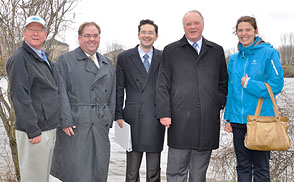It was only a year ago, just a couple of days before Earth Day, that the Harper Government(tm) announced their progress at tearing the heart out of Canada’s strongest habitat protection legislation.
Their re-writing of major portions of the Fisheries Act (a part of the Mother of All Omnibus Bills) sent shock-waves across the community of biologists, ecologists, and environmental scientists whose job it was to assure the protections afforded by legislation were followed by industry and the general public. This was partly because they recognized the combined neutering of the Fisheries Act and the Environmental Assessment Act would result in less protection of ecological areas, but mostly because the people whose job it was to advise their clients in industry about how to follow the laws now had very little idea what the law was!
It is like Victoria announcing (as part of their budget, none the less) that they would remove all references to speed limits from the Motor Vehicle Act, without telling the Police ahead of time, giving the police a chance to comment on the changes, assessing the potential impacts of the changes, or developing any mechanism to permit safe driving with no speed limits.
In typical Harper Government(r) style, they put a lot more thought into the photo op and announcement than they did into the actual legislation. Here we see a photo of Minister of Fishy Stuff Ashfield standing beside James Brennan of Ducks Unlimited, to demonstrate how conservation groups support the changes, so therefore it must all be good.
 |
| (source: http://www.ducks.ca/national-news/2012/04/duc-supports-strategic-direction-fisheries-act-changes/) |
I am going to put aside for now my own reservations about Ducks Unlimited. They are not so much an ecological protection group as a group interested in preserving areas where they can take their dogs for a walk while filling ducks with steel shot. However, they have been effective at preserving large tracts of vitally important wetlands, so I will judge them by results, not by motivations.
There they were, amongst Canada’s (well, America’s, but I guess DU is exempt Joe Oliver’s list of suspiciously-foreign-funded shit-list of environmental protection groups) most renown conservation groups lining up with the Minister of Fishiness talking about how this was going to be great, a bold step forward in fish protection rationalization and conservation management mumble mumble mumble…
At the time, it made more sense than appeared on the surface. Although the changes in the Fisheries Act were specifically requested by and delivered to large oil companies, at the time of the announcement all the talk was about how these amendments would help the poor suffering rural farmer who was tired of having to jump through regulatory hoops every time he wanted to maintain his drainage ditch.
Turns out now, the poor rural farmer got screwed, at least in BC. You see, until these changes, the farmer would simply ask his local Fisheries Officer to approve the works he needed done. The Fisheries Officer, being a local Fisheries and Oceans Canada employee with training in fish ecology would tell the farmer to follow standard fish protection practice (keep sediment out of the open stream, don’t work in the stream during windows of time critical to salmon lifecycles, don’t block the stream completely, etc.) and go for it. It was a simple straight-forward process that just paralleled good farming practice, it was completely free to the farmer (except for a week or two planning ahead), and there was lots of guidance available from the DFO. You know, government services you pay taxes for, that kind of stuff.
Now, that Fisheries Officer is no longer going to provide that approval, or that guidance. Mostly because she is likely one of the 30% of Fisheries and Oceans staff that got fired. The approval process will be centralized, so the person granting approvals will not necessarily know your local conditions, or even be a biologist. since the approvals are science-based, the poor farmer is likely going to need to hire a Qualified Professional (biologist, geoscientist or engineer) to assess whether the works constitute a threat to fish, then get that professional to help navigate through the approval process. Trust me, those professionals don’t come cheap.
Well, they are cheap in context of a multi-billion dollar pipeline project (as Big Oil Corp Inc. will already have Qualified Professionals on staff), but for a potato farmer in Chilliwack, that $200/hr consulting fee he will be paying to someone who recently got laid off from a job at DFO to complete an Aquatic Effects Assessment will not be small potatoes. These guys should be thinking about rounding up the calves and heading back downtown, because they just got royally screwed by Minister Ashfield and the Harper Government(tm).
Back to Ducks Unlimited. With the changes to the Fisheries Act being marketed last year as a big boon to long suffering farmers, it was little surprise that Ducks Unlimited, with its deep rural and agricultural support base, especially in the Prairies, were ready to line up in support of the changes. One year on, it seems they might have caught wind that the bag of ducks they were sold might contain more than one cat. Just this week, Ducks Unlimited Canada were signatories to a Joint Policy Statement with other conservation groups, which expresses significant concerns with the changes including:
“Without explicit policy support it will be unclear where the Act applies on the landscape making it difficult to implement and enforce”;
“If some forms of harm are not prohibited under the Act it is unclear how a long term trend of declining quality of recreational fisheries will be avoided due to incremental impacts”; and
“Recent reductions in staff and research facilities make it unclear how DFO intends to support implementation of the amended Act and the new fisheries protection policy”.
Makes me wonder how long until Ducks Unlimited are added to the list of foreign-funded radicals trying to destroy Canada through environmental protection.